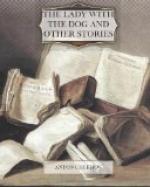“What does the coming day bring to me?”
But at once, as though afraid, he would get up and walk from the piano.
The visitors usually arrived about ten o’clock. They played cards in Orlov’s study, and Polya and I handed them tea. It was only on these occasions that I could gauge the full sweetness of a flunkey’s life. Standing for four or five hours at the door, watching that no one’s glass should be empty, changing the ash-trays, running to the table to pick up the chalk or a card when it was dropped, and, above all, standing, waiting, being attentive without venturing to speak, to cough, to smile—is harder, I assure you, is harder than the hardest of field labour. I have stood on watch at sea for four hours at a stretch on stormy winter nights, and to my thinking it is an infinitely easier duty.
They used to play cards till two, sometimes till three o’clock at night, and then, stretching, they would go into the dining-room to supper, or, as Orlov said, for a snack of something. At supper there was conversation. It usually began by Orlov’s speaking with laughing eyes of some acquaintance, of some book he had lately been reading, of a new appointment or Government scheme. Kukushkin, always ingratiating, would fall into his tone, and what followed was to me, in my mood at that time, a revolting exhibition. The irony of Orlov and his friends knew no bounds, and spared no one and nothing. If they spoke of religion, it was with irony; they spoke of philosophy, of the significance and object of life—irony again, if any one began about the peasantry, it was with irony.
There is in Petersburg a species of men whose specialty it is to jeer at every aspect of life; they cannot even pass by a starving man or a suicide without saying something vulgar. But Orlov and his friends did not jeer or make jokes, they talked ironically. They used to say that there was no God, and personality was completely lost at death; the immortals only existed in the French Academy. Real good did not and could not possibly exist, as its existence was conditional upon human perfection, which was a logical absurdity. Russia was a country as poor and dull as Persia. The intellectual class was hopeless; in Pekarsky’s opinion the overwhelming majority in it were incompetent persons, good for nothing. The people were drunken, lazy, thievish, and degenerate. We had no science, our literature was uncouth, our commerce rested on swindling—“No selling without cheating.” And everything was in that style, and everything was a subject for laughter.




